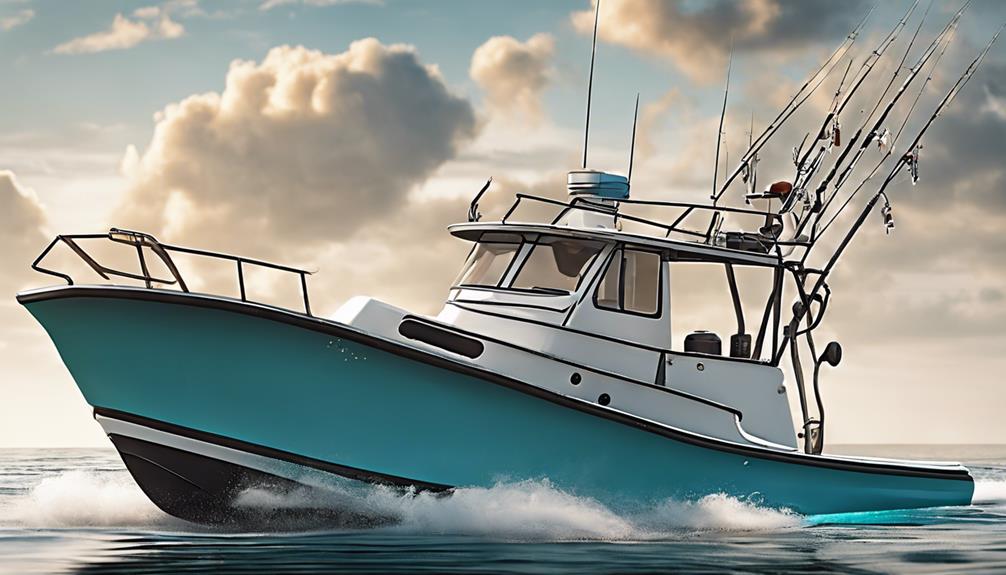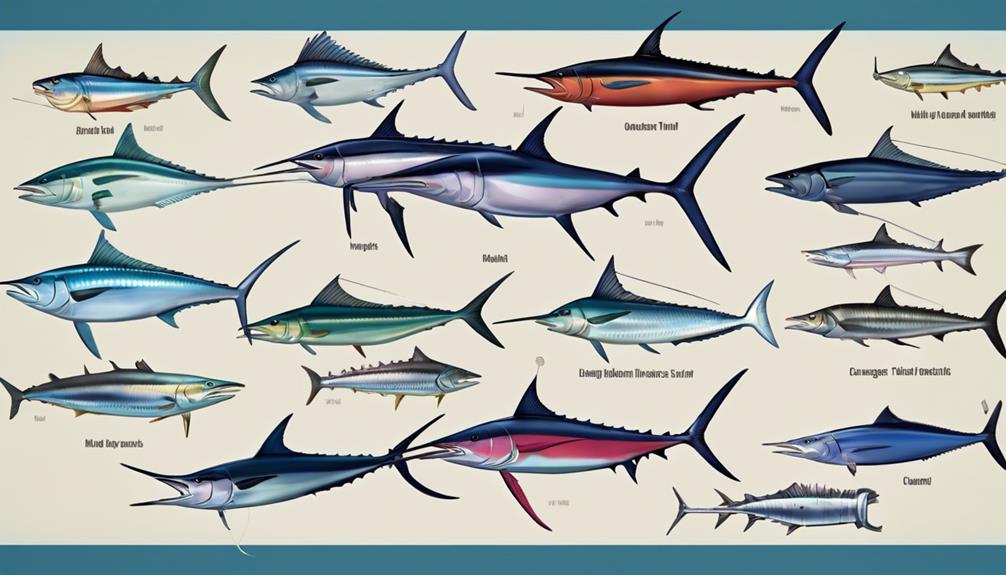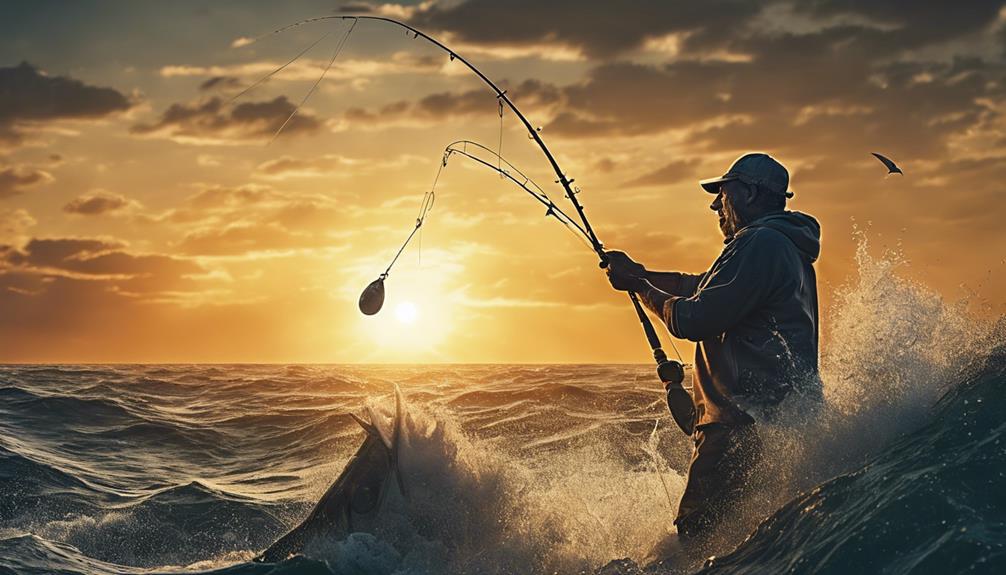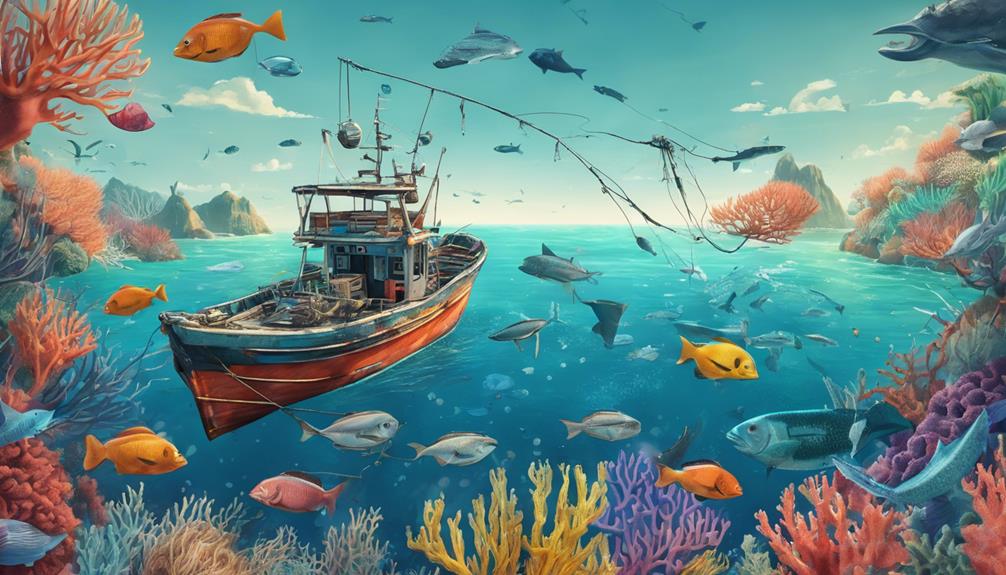Imagine the vast ocean stretching out before you, the sun glistening on the water as you prepare to embark on your deep sea fishing adventure.
But before you set sail, there are crucial boat requirements you need to meet to ensure a successful and safe trip.
From the ideal boat size to essential safety equipment, navigating legal requirements, and more, this guide will help you navigate the waters with confidence and preparedness.
Boat Size Requirements
When selecting a deep-sea fishing boat, consider the recommended size to ensure a safe and comfortable fishing experience. Safety measures are crucial when out on the open water, and having a boat that's the right size can greatly enhance your overall fishing trip.
One key aspect to think about is equipment storage. A boat that's too small may not have adequate storage space for all your gear, leading to clutter and potential safety hazards. On the other hand, a boat that's too large for your needs may make it challenging to access essential equipment quickly.
Having a boat of the appropriate size ensures that safety measures can be properly implemented. For example, a larger boat typically offers more stability in rough waters, reducing the risk of accidents. Additionally, with sufficient space for equipment storage, you can organize your gear efficiently, keeping walkways clear and minimizing the chances of tripping or falling overboard. These seemingly small details can make a significant difference in ensuring a safe and enjoyable deep-sea fishing expedition.
To optimize your fishing experience, carefully assess the size of the boat in relation to your specific needs. Consider the number of people you'll typically have on board, the amount of equipment you need to bring, and the type of fishing you plan to do. By prioritizing safety measures and equipment storage when selecting a deep-sea fishing boat, you set the foundation for a successful and stress-free outing.
Safety Equipment Needed
To ensure a safe and successful deep-sea fishing trip, it's essential to have the necessary safety equipment on board. When venturing out into the open waters, emergency preparedness should be a top priority. Here are some key safety items you should have on your deep-sea fishing boat:
- Life Jackets: Life jackets are crucial for every person on board. Make sure you have enough properly fitting life jackets for everyone, including children. In case of an emergency, these can be life-saving.
- Emergency Signaling Devices: Equip your boat with emergency signaling devices such as a whistle, air horn, or a flare gun. These tools can help attract attention if you're in distress and need assistance.
- First Aid Kit: A well-stocked first aid kit is essential for handling minor injuries and medical emergencies that may occur during the fishing trip. Include items like bandages, antiseptic wipes, pain relievers, seasickness medication, and any necessary personal medications.
Fishing Gear Essentials
Ensure your deep-sea fishing boat is equipped with the essential fishing gear for a successful and enjoyable fishing experience. When it comes to tackle selection, having a variety of options is key. Pack a range of weights, hooks, and lures to adapt to different fishing conditions. Make sure to organize your tackle box efficiently to locate items quickly. Regular rod maintenance is crucial for optimal performance. Check your rods for any signs of damage or wear and tear before heading out to sea.
As for bait options, consider both live and artificial baits to attract a wider range of fish species. Live bait such as shrimp, squid, or minnows can be highly effective, while artificial lures like jigs or spoons offer versatility. Experiment with different bait types to see what works best for the fish you're targeting. Understanding various fishing techniques is also essential. Whether you're trolling, bottom fishing, or casting, knowing the right technique for the situation can significantly increase your chances of a successful catch.
Navigation and Communication Tools
Considering the vastness of the open sea, how do you ensure your deep-sea fishing boat is equipped with the necessary navigation and communication tools for a safe and successful trip? When venturing into the deep waters, having the right tools can make a significant difference in your overall fishing experience.
Two essential items to consider are GPS technology and VHF radios.
- GPS Technology: Global Positioning System (GPS) technology is crucial for deep-sea fishing trips as it provides accurate real-time information about your boat's location. This tool helps you navigate through the vast ocean expanses, ensuring you can easily find your way back to shore or specific fishing spots.
- VHF Radios: Very High-Frequency (VHF) radios are indispensable for communication at sea. They allow you to stay connected with other boats, marine authorities, and even call for help in case of emergencies. Reliable communication is key to ensuring your safety and the safety of others on the water.
- Emergency Position Indicating Radio Beacon (EPIRB): An EPIRB is a crucial safety device that can be activated in emergencies to transmit your location to search and rescue teams. Having an EPIRB onboard provides an added layer of security, especially in remote deep-sea locations where immediate assistance may be challenging to obtain.
Proper Storage Solutions
For efficient organization and accessibility of equipment on your deep-sea fishing boat, prioritizing proper storage solutions is essential. When it comes to tackle organization, investing in tackle boxes with compartments can help keep your gear sorted and easily accessible. Stowing away extra hooks, sinkers, and lures in labeled containers will save you time when you need to replace them during a busy fishing session.
To ensure bait preservation, having a dedicated cooler or bait well is crucial. Keeping live bait separate from your catch can help maintain its freshness and effectiveness. Additionally, having a system in place to dispose of unused bait properly will help keep your boat clean and odor-free.
Consider installing rod holders along the sides of your boat to prevent tangled lines and provide a secure place for your rods when not in use. Utilizing overhead storage compartments or racks can help maximize deck space and keep walkways clear for safer movement while fishing.
Remember to regularly check and organize your storage solutions to maintain efficiency on your deep-sea fishing adventures. By prioritizing tackle organization and bait preservation, you can enhance your overall fishing experience and make the most of your time out on the water.
Engine Power Considerations
To maximize your deep-sea fishing boat's performance and efficiency, evaluating the engine power considerations is crucial. When choosing the right engine power for your vessel, there are a few key factors to keep in mind:
- Fuel Efficiency: Opt for engines that offer good fuel efficiency to ensure you can cover long distances without constantly refueling. Fuel-efficient engines not only save you money in the long run but also reduce your environmental impact by consuming less fuel per nautical mile.
- Propulsion Systems: Consider the different propulsion systems available for deep-sea fishing boats, such as outboard motors, inboard motors, or pod drives. Each system has its advantages and disadvantages, so choose one that best suits your fishing needs and preferences. For example, outboard motors are easy to maintain and repair, while inboard motors provide better weight distribution.
- Power Requirements: Determine the power requirements based on the size and weight of your boat. Make sure the engine power is sufficient to propel your vessel effectively, especially in rough sea conditions. Having the right amount of power ensures a smoother and safer fishing experience for you and your crew.
Maintenance and Cleaning Tips
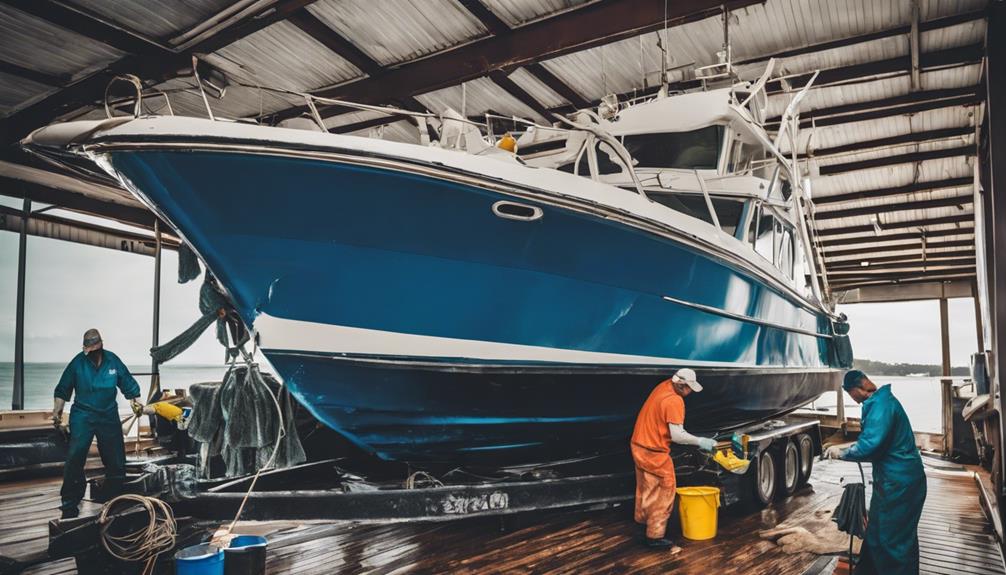
Keeping your deep-sea fishing boat in top condition requires regular maintenance and proper cleaning routines. To ensure your vessel stays in optimal shape for your fishing excursions, implementing preventative maintenance measures is crucial. Regularly inspecting the hull for any signs of damage, checking the engine components, and lubricating moving parts are essential tasks to prevent breakdowns at sea.
When it comes to cleaning techniques, washing your boat with fresh water after each trip helps remove salt and debris that can corrode surfaces over time. Use mild soaps and non-abrasive tools to clean the deck, hull, and any fishing equipment to maintain their longevity. Additionally, flushing the engine with freshwater and checking for any salt build-up can prevent engine damage and ensure smooth operation.
Incorporating a routine maintenance schedule into your boating routine can save you time and money in the long run. Regularly changing engine oil, inspecting the propeller, and checking the electrical systems are all part of good preventative maintenance practices. Keeping your boat clean and well-maintained not only prolongs its lifespan but also enhances your overall fishing experience by reducing the risk of unexpected issues while out at sea.
Legal Requirements Checklist
Regularly ensuring your deep-sea fishing boat meets legal requirements is essential for safe and compliant maritime operations. To help you navigate the legal waters smoothly, here is a checklist to ensure your vessel is up to par:
- License Documentation: Make sure all necessary licenses and permits for operating a deep-sea fishing boat are valid and readily available onboard. These documents typically include fishing permits, vessel registration, and any other required certifications.
- Safety Regulations: Familiarize yourself with and adhere to all safety regulations outlined by maritime authorities. This includes having the required safety equipment such as life jackets, fire extinguishers, distress signals, and emergency lights onboard at all times.
- Insurance Coverage and Emergency Protocols: Confirm that your boat is adequately insured for deep-sea fishing activities. Additionally, establish clear emergency protocols for various scenarios such as medical emergencies, man overboard situations, or engine failures. Conduct regular drills with your crew to ensure everyone knows their roles in case of an emergency.
Frequently Asked Questions
What Are Some Common Deep Sea Fishing Techniques and Tips for Beginners?
When starting out with deep sea fishing, it's important to learn some basic techniques and tips. Beginners should focus on choosing the right equipment and finding good fishing spots.
Remember to use the appropriate bait and tackle for the type of fish you're targeting. Pay attention to the weather and sea conditions for a successful fishing trip.
Start by practicing casting and reeling techniques to improve your skills. Enjoy the adventure of deep sea fishing!
Are There Any Specific Regulations or Restrictions for Deep Sea Fishing in Different Locations?
When it comes to deep sea fishing, you need to be aware of specific regulations and restrictions in different locations. Fishing regulations vary depending on where you are, so always check beforehand.
Some areas may have restrictions on catch limits or protected species. Safety measures like wearing life jackets and following guidelines can help ensure a successful and enjoyable fishing trip while respecting the local rules and regulations.
How Do You Properly Handle and Release Caught Fish to Ensure Their Survival?
When handling fish for catch and release, remember to treat them with care for their survival. Proper fish handling is crucial for conservation efforts.
Always use wet hands to minimize damage to their protective slime layer. Avoid excessive handling to reduce stress on the fish.
Practice ethical fishing by releasing fish gently back into the water. By following these guidelines, you can contribute to the well-being of fish populations and promote sustainable fishing practices.
What Are Some Common Challenges or Risks Associated With Deep Sea Fishing Trips?
When heading out on deep sea fishing trips, you may encounter various challenges and risks. Safety precautions like wearing life jackets and following proper boat procedures are crucial. Weather conditions can change quickly, so stay updated and prepared.
Regular equipment maintenance is vital to avoid breakdowns at sea. Know emergency procedures in case of accidents. By staying alert and prepared, you can enjoy your deep sea fishing adventure while staying safe.
How Can I Properly Prepare for a Deep Sea Fishing Trip in Terms of Food, Drinks, and Other Supplies?
When prepping for a deep sea fishing trip, focus on meal planning and packing essentials. Pack non-perishable snacks like granola bars and nuts.
Make sandwiches for easy lunches. Bring plenty of water and sports drinks to stay hydrated. Don't forget sunscreen, hats, and sunglasses.
Pack seasickness medication just in case. Keep all items in waterproof bags or containers.
Properly preparing your food, drinks, and supplies can make your trip more enjoyable and worry-free.
Conclusion
Now that you have a clear understanding of the requirements for a successful deep sea fishing trip, you can confidently prepare your boat for your next adventure.
Remember to check off all the necessary safety equipment, fishing gear, and communication tools before heading out to sea.
By following these guidelines, you can ensure a safe and enjoyable fishing experience for yourself and your crew.
Happy fishing!
